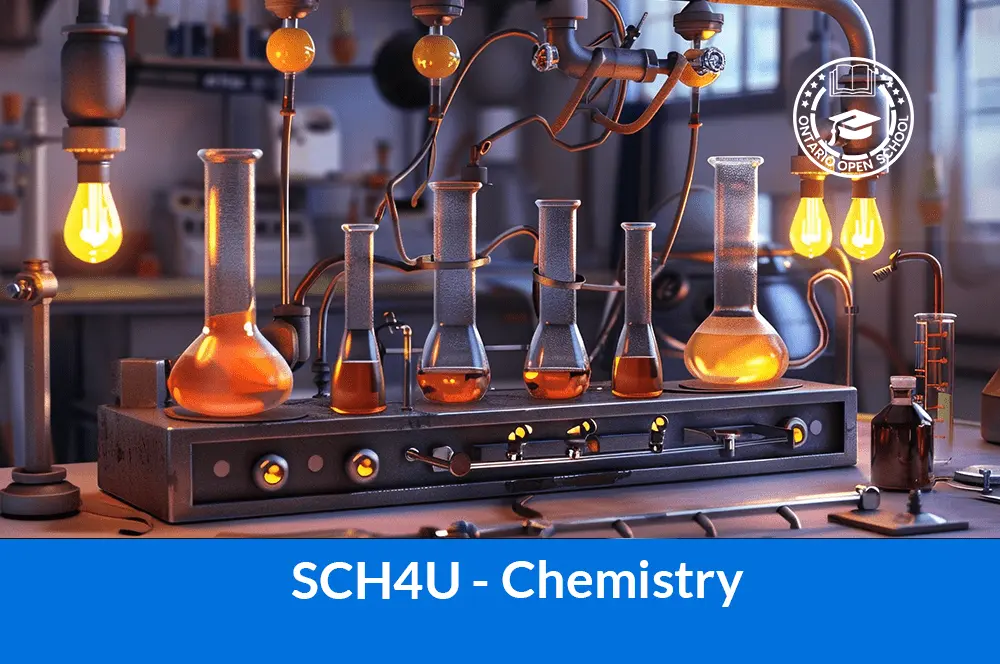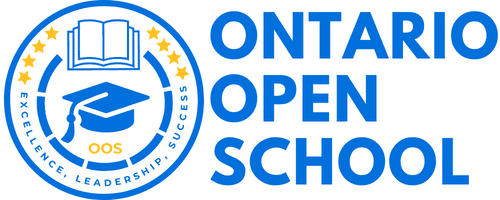- info@ontarioopenschool.com
- 647-494-4499
-
Unit 100 - 29 Gervais Drive, North York, ON.
M3C 1Y9
Copyright 2024 Ontario Open School Inc. All Rights Reserved.
This course enables students to deepen their understanding of chemistry through the study of organic chemistry, the structure and properties of matter, energy changes and rates of reaction, equilibrium in chemical systems, and electrochemistry. Students will further develop their problem-solving and investigation skills as they investigate chemical processes, and will refine their ability to communicate scientific information. Emphasis will be placed on the importance of chemistry in everyday life and on evaluating the impact of chemical technology on the environment.
Unit Order | Unit Name | Suggested Time |
|---|---|---|
| Unit 1 | Organic Chemistry Students will demonstrate an understanding of how the predictable chemical and physical properties of organic compounds are determined by their respective structures. They will also assess the significant implications of organic chemical reactions and their applications for society, human health, and the environment. | 21 hours |
| Unit 2 | Structure and Properties of Matter Students will demonstrate an understanding of how the nature of attractive forces that exist between particles in a substance determines the properties and limits the uses of that substance. They will also evaluate the societal benefits and costs of technological devices that are based on the principles of atomic and molecular structures. | 20 hours |
| Unit 3 | Energy Changes and Rates of Reaction Students will demonstrate an understanding of how energy changes and rates of reaction can be described quantitatively. They will investigate ways to improve the efficiency of chemical reactions by applying optimal conditions. Students will also evaluate the societal and environmental costs and benefits of technologies that transform energy. | 21 hours |
| Unit 4 | Chemical Systems and Equilibrium Students will demonstrate an understanding of the predictable ways in which chemical systems are dynamic and respond to changing conditions. They will also assess the significant implications for nature and industry of applying chemical systems at equilibrium. | 22 hours |
| Unit 5 | Electrochemistry Students will demonstrate an understanding of the predictable way in which electrons are transferred from one substance to another in oxidation and reduction reactions. They will also assess the significant implications of controlling and applying oxidation and reduction reactions for industry, health and safety, and the environment. | 18 hours |
| Final Evaluation 30% | Final Project Final exam | 6 hours 2 hours |
| Total | 110 hours |
A wide variety of instructional strategies are used to provide learning opportunities to accommodate a variety of learning styles, interests and ability levels. These strategies include, but are not limited to:
| Oral Presentation | Activity Learning Centers | Carousel | Guided Exploration |
| Discussion | Think Pair Share | Lecture | |
| Socratic Lesson | Visual Stimuli | Worksheet | |
| Independent Study | Note Making | Inquiry Process | |
| Research Process | Scientific Method | Concept Map | |
| Computer Assisted Instruction | Media Presentation | Jigsaw | |
| Consequence Map | Flow Chart | Brainstorming | |
| Mind Map | Role Play | Demonstration | |
| Problem Solving | Experimenting | Reflection |
Purpose
The primary purpose of assessment is to improve student learning. Assessment relates directly to the expectations for the course.
A variety of assessments for and as learning are conducted on a regular basis to allow ample opportunities for students to improve and ultimately demonstrate their full range of learning and for the teacher to gather information to provide feedback. Assessment tasks relate to the success criteria set out in lesson plans. Success criteria allow students to see what quality looks like.
Evaluation is the process of judging the quality of student work in relation to the achievement chart categories and criteria and assigning a percentage grade to represent that quality. Evaluation is based on gathering evidence of student achievement through:
Assessment for Learning – we provide feedback and coaching. Assessment FOR Learning is the process of seeking and interpreting evidence for the use of learners and their teachers to decide where the learners are in their learning, where they need to go, and how best to go there.
Assessment as Learning – we help students monitor progress, set goals, reflect on their learning
Assessment AS Learning is the process of the explicit fostering of students’ capacity over time to be their own best assessors, but teachers need to start by presenting and modeling external, structured opportunities for students to assess themselves.
Assessment of Learning – we use assessments to provide evaluative statements about student achievement. Assessment OF Learning is the assessment that becomes public and results in statements of symbols
(marks/grades/levels of achievement) about how well students are learning. It often contributes to pivotal decisions that will affect students’ future.
ASSESSMENT TOOLS
Strategies for Assessment and Evaluation of Student Performance
| Units | Duration | EXP. | AFL | AAL | AOL | K
25% |
A
25% |
C
25% |
T 25% |
|
|
70% |
A | Integrated throughout the course | A1-A2 |
Student – Teacher Conferencing |
Peer Assessment | Independent Project | • | • | • | • |
| B | 25 | B1-B3 | Worksheet
Class Discussion Exit Card |
KWL Chart | Unit Test
Student- Teacher Conferencing |
• | • | • | • | |
| C | 20 | C1-C3 | Assigned Questions
Group Discussion |
Learning Log
Worksheet |
Unit Test
Class Discussion |
• | • | • | • | |
| D | 25 | D1-D3 | Student – Teacher Conferencing | Reflective Discussion | Unit Test
Poster Presentation |
• | • | • | • | |
| E | 22 | E1-E3 | Homework
Exit Card
|
Peer Pair Assessment | Unit Test
Performance Task |
• | • | • | • | |
| F | 18 | F1-F3 | Q/A Session
Diagnostic Test |
Student-Teacher Conferencing | Unit Test
Collaborative Project |
• | • | • | • | |
| 30% |
Final Exam 30% (A1-F3)
|
• | • | • | • | |||||
Resources
Grading
Weighting of categories
| Knowledge/Understanding | Thinking/Inquiry | Communication | Application |
| 25 % | 25 % | 25 % | 25 % |

Course Grade | Grade 12 |
|---|---|
Course Code | SCH4U |
Course Category | Science |
Course Type | University Preparation |
Course Delivery | Online |
Course Duration | 8hrs |
Course Credit | 0 |
Copyright 2024 Ontario Open School Inc. All Rights Reserved.
